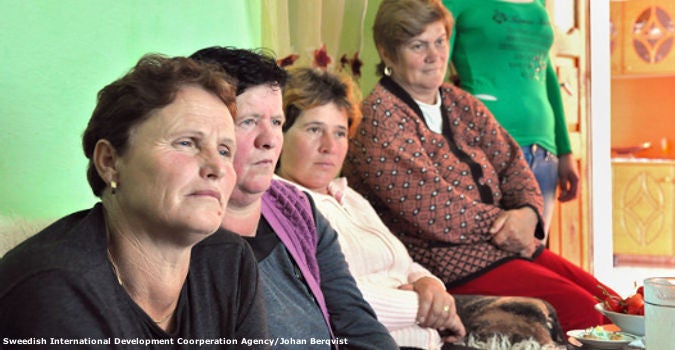Economic Empowerment

Providing access to employment and better income opportunities are among the most effective ways to empower women. Yet, little has been done in Albania to address a persistent gender pay gap or improve women’s access to the labour market, entrepreneurship services and credit.
Women’s average salary is almost 18 per cent lower than men’s in urban areas and doubly lower in rural areas. Women are over-represented in Albania’s informal economy and as unpaid family workers in businesses and on farms. Over 50 per cent of Albanian women work in agriculture – 87 per cent of them in unpaid family jobs – and rural women are not covered by basic social, pension and health services.
Few women own or manage companies or sit on company boards. Women own or manage only 28.5 per cent of all enterprises, many of which are under-capitalised small and medium enterprises in highly informal lower value-added sectors. Only 27.9 per cent of company board members are women; over 43 per cent of companies have no women on their board.
To change this, UN Women works with Albania’s Government, private sector and civil society to support policies and initiatives that:
- Improve women’s economic empowerment;
- Reduce the gender wage gap;
- Promote women’s rights in the workplace;
Provide women with better access to credit, economic aid and basic social services.
UN Women in Action in Albania
Working to ensure that key national strategies embed gender equality and greater economic opportunity for women, UN Women’s Economic Empowerment programme supports national gender equality priorities outlined in:
- The Government of Albania’s National Strategy for Gender Equality and Reduction of Gender Based Violence (2016-2020);
- The Business and Investment Strategy (2014-2020);
- The ground-breaking National Action Plan for Women’s Entrepreneurship (2014-2020) developed with UN Women technical assistance;
- The National Strategy for Development and Integration (NSDI) 2013-2020.
The Programme provides supports to the Albanian Government to meet its international obligations relating to women’s economic empowerment, including:
- The Beijing Platform for Action, which commits governments to ensure women’s equal access to economic resources, including land, credit science and technology, vocational training, information, communication and markets;
- The Convention on the Elimination of All Forms of Discrimination against Women (CEDAW), and its provisions on employment, economic and social benefits and on rural women;
- The UN’s Sustainable Development Goals (SDGs), particularly SDG 5, a stand-alone goal on gender equality and the empowerment of women and girls, and gender targets in other SDGs;
- EU legislation on gender equality.
UN Women also works with Albania’s private sector to increase women’s participation in the work force, corporate leadership and supply and distribution networks through the Women's Empowerment Principles of the UN Global Compact and UN Women.
To put women at the centre of government economic policies, the Economic Empowerment Programme provides support to key ministries and institutions to implement women-oriented economic policies and programs, and promote:
- Strategies and policies for better education and vocational training and higher decent employment opportunities for women;
- Reduced labour market gender segregation;
- Laws that strengthen women’s rights in the workplace;
- Greater knowledge and skills for rural women;
- Women’s self-employment and entrepreneurship opportunities;
- A favourable environment for women-led businesses;
- Data capture to support business development;
- Mentoring programmes and business networks for women entrepreneurs in SMEs.